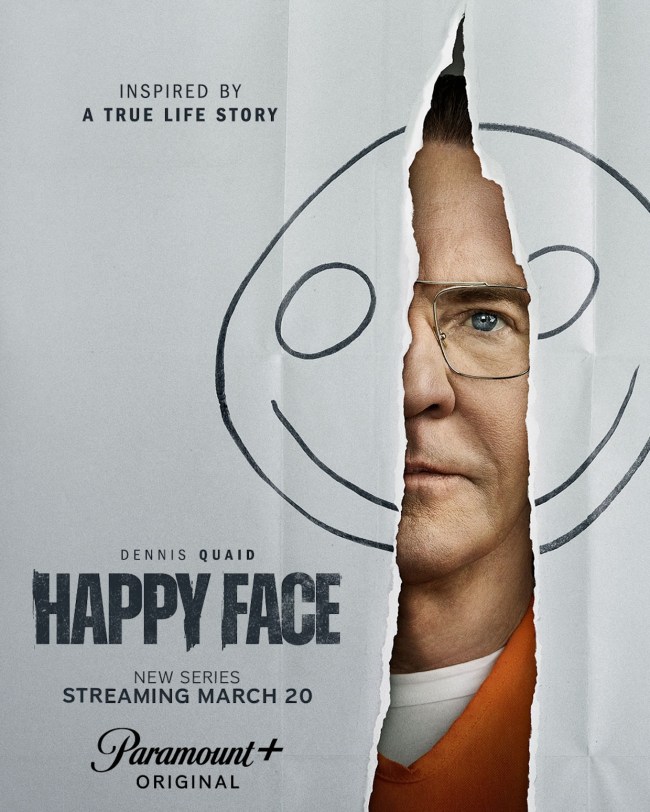The highly anticipated series Happy Face, starring the legendary Dennis Quaid, is set to premiere on Paramount+ on March20. This gripping true crime drama delves into the chilling story of the “Happy Face Killer,” one of America’s most notorious serial killers, and the profound impact his crimes had on his family, particularly his daughter. With its blend of psychological tension, emotional depth, and a stellar cast, “Happy Face” promises to be a standout addition to the true crime genre.
The Story Behind “Happy Face”
It is based on the real-life story of Keith Hunter Jesperson, a long-haul trucker who terrorized the United States in the 1990s . Jesperson earned the moniker “Happy Face Killer” after he began drawing smiley faces on his taunting letters to the media and law enforcement. Over the course of his spree, he confessed to murdering eight women, though the true number of his victims remains uncertain.The series, however, does not focus solely on Jesperson’s crimes.
Instead, it explores the devastating ripple effects of his actions on his family, particularly his daughter, Melissa Moore. Melissa, who was a teenager when her father’s crimes came to light, spent years grappling with the trauma of discovering her father’s true identity. The series is adapted from Moore’s memoir, “Shattered Silence”, which chronicles her journey of coming to terms with her father’s atrocities and finding her own path to healing.
Dennis Quaid as the “Happy Face Killer” Dennis Quaid takes on the challenging role of Keith Hunter Jesperson, marking a departure from his more heroic and charismatic characters. Quaid’s portrayal of Jesperson is expected to be both chilling and nuanced, capturing the duality of a man who was a loving father to his children and a cold-blooded killer to his victims. Quaid’s casting has generated significant buzz, as the actor is known for his versatility and ability to embody complex characters. His performance in “Happy Face” is already being touted as one of the highlights of the series, with early reviews praising his ability to convey Jesperson’s charisma and menace in equal measure.
The Emotional Core: Melissa Moore’s Story
At the heart of “Happy Face” is Melissa Moore’s story, portrayed by newcomer Anna-Leigh Ashford. The series explores Melissa’s struggle to reconcile the man she knew as her father with the monster he became. It delves into her feelings of guilt, shame, and betrayal, as well as her determination to rebuild her life and protect her own family from the shadow of her father’s crimes.Ashford’s performance is expected to be a revelation, capturing Melissa’s resilience and vulnerability as she navigates the complexities of her identity.
The series also highlights Melissa’s advocacy work, as she has become a prominent voice for victims’ rights and a advocate for breaking the cycle of generational trauma.
A Stellar Supporting CastIn addition to Quaid and Ashford, “Happy Face” features a talented supporting cast that brings depth and authenticity to the story. Notable cast members include:- Minka Kelly as a detective determined to bring Jesperson to justice.- Garret Dillahunt as a journalist who uncovers key details about the case.- “Sarah Paulson” as a therapist who helps Melissa process her trauma.The ensemble cast ensures that the series is not just a crime drama but also a poignant exploration of the human condition.
The Creative Team Behind the Series “Happy Face” is helmed by a team of seasoned creators and writers who have a proven track record in the true crime genre. The series is developed by Robert and Michelle King, the duo behind critically acclaimed shows like “The Good Wife” and “Evil”. Their signature blend of suspense, moral complexity, and character-driven storytelling is evident in “Happy Face”.
The writing team has taken great care to balance the gruesome details of Jesperson’s crimes with the emotional journey of his family. The result is a series that is as much about the psychology of a killer as it is about the resilience of those left in his wake.
Themes and Takeaways
“Happy Face” is more than just a true crime drama; it is a meditation on the nature of evil, the power of redemption, and the enduring strength of the human spirit. The series explores several key themes:
The Impression of Trauma
The series delves into the long-lasting effects of trauma on individuals and families. Melissa’s journey is a testament to the resilience of the human spirit and the possibility of healing even in the face of unimaginable pain.
The Complexity of Identity
“Happy Face” raises questions about identity and how we define ourselves in relation to our family and past. Melissa’s struggle to separate herself from her father’s legacy is a central theme of the series.
The Nature of Evil
Through Quaid’s portrayal of Jesperson, the series examines the banality of evil and the ways in which seemingly ordinary individuals can commit heinous acts.
The Power of Forgiveness
The series also explores the concept of forgiveness, both of others and of oneself. Melissa’s journey toward forgiveness is a powerful reminder of the importance of compassion and understanding.
The True Crime Genre
As a cultural phenomenon, “Happy Face” arrives at a time when the true crime genre is more popular than ever. From podcasts to documentaries to scripted series, audiences are fascinated by stories of real-life crime and the psychology of those who commit them.The series stands out in this crowded landscape by focusing not just on the crimes themselves but on the human stories behind them. By centering Melissa’s perspective, “Happy Face” offers a fresh and deeply personal take on the true crime genre.
Early Reception and ExpectationsEarly reviews of “Happy Face” have been overwhelmingly positive, with critics praising its compelling storytelling, strong performances, and emotional depth. The series has been described as “a haunting exploration of the human psyche” and “a powerful testament to the resilience of the human spirit.”
Viewers can expect a gripping and thought-provoking experience that will keep them on the edge of their seats while also prompting reflection on the themes and issues raised by the story.
Why “Happy Face” Matters
In a world where true crime stories often sensationalize violence and focus on the perpetrators, “Happy Face” offers a different perspective. By centering Melissa’s story, the series highlights the impression of crime on the families of perpetrators and the importance of empathy and understanding.
The series also serves as a reminder of the power of storytelling to shed light on difficult and often painful subjects. Through its nuanced portrayal of Jesperson and his family, “Happy Face” encourages viewers to confront uncomfortable truths and consider the complexities of human behavior.
Final Thoughts
“Happy Face” is poised to be one of the most talked-about series of the year, thanks to its compelling story, stellar cast, and thoughtful exploration of difficult themes. Dennis Quaid’s portrayal of Keith Hunter Jesperson is sure to be a standout, while Anna-Leigh Ashford’s performance as Melissa Moore will resonate with viewers on a deeply emotional level.As the true crime genre continues to evolve, “Happy Face” sets a new standard by focusing on the human stories behind the headlines.
Its premiere on March 20 on Paramount+ is an event not to be missed for fans of crime dramas and thought-provoking storytelling alike.Prepare to be captivated, challenged, and moved by “Happy Face”—a series that is as much about the darkness within as it is about the light that can emerge from it.
No comments yet.








